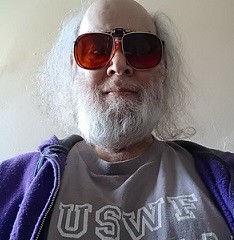Friday, October 19, 2018
I Spit On The Grave of Pay-Per-View
by Eddie Goldman
The critters who run boxing have made an art and a science of emptying the wallets of the sport's fans better than any knife-wielding, mask-wearing robber. For years they have convinced a small but declining section of the public to pay, pay, and pay again for their "must-see" and "great" fights, including several declared to be "the fight of the century".
You could once watch boxing on TV for free or listen to it on the radio in the U.S. several nights a week. There were far fewer programming choices in those days of the 1940s, 50s, and 60s, than there are now.
Even then the wheels were in motion for colossal rip-offs. From exclusively showing major fights in movie theaters for inflated prices from the 1940s to the 1970s and after, and to hiding them behind the paywalls of premium cable and pay-per-view when access to those became widespread enough, the lords of boxing managed to enrich themselves while taking boxing from a major mainstream sport into a niche venture whose top fighters were unknown to succeeding generations. The top boxers used to be household names, and all sports fans knew who the heavyweight champion of the world was, especially since in the past there was usually just one. Pay-per-view took care of that inconvenience to the promoters' and networks' capital accumulation.
Oh yes, there were a few breakout stars during this pay-per-view period, such as Mike Tyson, Oscar De La Hoya, Floyd Mayweather, and, to a degree in some places, Saul "Canelo" Alvarez. But just ask people who are not in AARP who Roy Jones Jr., Bernard Hopkins, Andre Ward, and the Klitschkos are. If they are not dedicated boxing fans, you will likely get answers ranging from basketball players to indicted co-conspirators in the Mueller investigation.
But even more than the damage caused by the cancerous growth of sanctioning bodies, titles, and weight classes, the closeting of boxing's top stars gradually made them and their sport not only a niche product, but usually a culturally and socially irrelevant one, too. Pay-per-view has been killing boxing, and thus itself, just like a slow-acting poison murders its victim. The difference in this case is that all this was self-inflicted.
And now, it pleases me to report, the chickens have come home to roost. The recent exit of HBO from boxing not only signifies that "adapt or die" is still a potent maxim, but also that the pay-per-view model, pioneered by them, has collapsed, and fast and hard.
This Wednesday it was announcement that Canelo, the last boxing pay-per-view star, and now former HBO fighter, had signed a reported five-year, 11-fight, $365 million deal with the DAZN streaming service. Along with him came his promoters, Oscar De La Hoya's Golden Boy Promotions, which will put on up to 10 fight nights a year on DAZN starting in 2019.
Critical to this deal, and not highlighted by most of the commentaries on it, is that the announcement of it said: "These fights will be available in all DAZN markets, including the United States, Canada, Italy, Germany, Austria, Switzerland and Japan." So as DAZN, which only started showing live events in the U.S. last month, expands to more countries and gains rights to show more sports in each of them, the audience for these Golden Boy and Canelo fights will expand accordingly.
Canelo's first DAZN fight will be on December 15 against WBA super middleweight champ Rocky Fielding, and take place in Madison Square Garden. DAZN, whose subscription fee is about ten bucks a month after a one-month free trial, promised to make this fight available for free to non-subscribers and subscribers alike.
What was most likely the last HBO pay-per-view took place last month and featured Canelo fighting Gennady Golovkin in a rematch of their controversial draw from last year. The price for this card alone was about $85 on cable. Now you can watch all of Canelo's fights on DAZN, including all their various boxing and other sports shows, for that one fee. There is no dealing with the stankiest of companies, the cable monopolies, unless you rely on them for overall Internet access anyway. Cable, which once disrupted the broadcast TV business, has itself been disrupted by this emerging technology.
While this signing may be viewed as an historical turning point for boxing, it is only part of a greater transition from the dominance of cable in the U.S. to a new paradigm where streaming on all sorts of connected devices existing and yet to come takes precedence.
If you want to watch the latest "Star Trek" series, including both "Discovery" and a new untitled one starring Patrick Stewart, you need to subscribe to the CBS All Access streaming service, whether that is the logical thing to do or not. Disney is rolling out new streaming services which will become the exclusive online home of their movies and shows, which will soon be pulled from competing services like Netflix. There is a growing list of these streamers, known in the bizarre industry jargon as over-the-top or OTT services. The expected rollout of 5G in the U.S., which promises super-fast connections, and has already begun in a few trial areas, will only accelerate these developments.
Just where this all ends, which ones survive and which fail, and which ones merge and gobble up the rest, is not yet known. But it is clear that we are increasingly living in an OTT world, and resistance is futile.
Boxing has ridden the crest of emerging technologies, at least since Thomas Edison filmed a boxing exhibition between James J. Corbett and Peter Courtney in 1894, through the days of talking pictures, radio, broadcast TV, cable, and now Internet and mobile. That does not mean, however, that the companies using these new technologies immediately were economically viable. That may take years to accomplish.
In the 1870s, a new, struggling company tried to sell its patents to Western Union, then one of the largest companies in America. Western Union, after a patent fight, declined to work with them. That little company soon became known as the Bell Telephone Company, and later AT&T.
In 1954, the Time-Life media conglomerate launched a new magazine. It would lose money for about a decade, and take that long to hone its content. That magazine is Sports Illustrated, today with new owners, a web site, and available on all the modern conveniences. (While studying magazine publishing at NYU's grad school in the 1980s, we were clearly taught that successful big magazines should expect to lose money for at least five years before they became solvent.)
In 1994, a pie-in-the-sky online bookstore was launched in a garage, soon after the World Wide Web became widely available. In those days it was sometimes on the verge of bankruptcy, and was often ridiculed by the old guard of the business world. That company, Amazon, is now a profitable, multi-billion dollar operation.
Another company, founded in 1997, tried to make a go of it by renting DVDs and shipping them out via the post office. After unsuccessfully trying to sell this money-losing company, they figured out how to innovate and survive. That company then, and now, is known as Netflix.
Tellingly enough, an article in a fixture of the old media which is trying to prosper in today's world, The New York Times, said that Netflix had an "unorthodox media model." They are betting on a formula of: "Spend big now, and reap a massive subscriber base (and big profits) later. Possibly much later." Yet such a model is actually quite common for media companies, even if most fail.
(https://www.nytimes.com/2018/10/17/business/media/netflix-streaming-competition.html)
None of this, of course, is any guarantee that DAZN won't end up on another list that includes the Edsel, Kodak, Blockbuster, MySpace, Radio Shack, and more recently Toy R Us. But to attack DAZN now as a flop awaiting collapse, as some of boxing's bought-off "media" are already saying or implying, is nothing short of propaganda for the few beneficiaries of the actually collapsing boxing pay-per-view model.
DAZN has only been around since 2016, starting in the U.S. and Italy this year. It is backed by the multi-billionaire Len Blavatnik and his Access Industries. Originally from the Ukraine in what was then the Soviet Union, Blavatnik now is a citizen of both the U.S. and U.K., and is reportedly the richest man in the U.K. and 50th richest in the world. Since 2011 one of his companies has owned the Warner Music Group. A 61-year-old, short, pudgy, balding man, Blavatnik can be seen hobnobbing with an assortment of celebrities and ruling class figures in a recent in-depth but unflattering profile in The Hollywood Reporter called "Music's Mystery Mogul: Len Blavatnik, Trump and Their Russian Friends", at https://www.hollywoodreporter.com/features/why-is-warner-music-group-owner-len-blavatnik-russia-probe-1150550.
The Perform Group is the parent company of DAZN, but news reports indicate that Perform is seeking to split into two, sell off its non-DAZN operations, and rename itself the DAZN Group. (https://www.telegraph.co.uk/business/2018/10/14/billionaire-blavatnik-plots-break-sale-perform-empire-fund-netflix/)
The cash from these sales would be added to its coffers as it buys up sports rights around the world in its quest to become the mythical "Netflix of sports". The Canelo-Golden Boy deal must be seen in this light.
Just like magazines initially lose money as they pay for compelling content to attract a paying audience, DAZN is in the early stages of acquiring that content through different marquee sports in countries where the rights are available. Some of that means getting out-of-market streaming rights, like to the NFL in Canada or MLB, NFL, and NBA in Europe, and some of that is getting the streaming rights to top-tier events in their home countries, like Serie A football in Italy and Matchroom Boxing and Bellator MMA in the U.S.
For boxing, besides the Canelo-Golden Boy deal, DAZN began its U.S. streaming operation with a slate of at least 32 Matchroom cards per year, half from the U.S, and half from the U.K. and Europe. With Matchroom promising to expand to more countries, presumably all those cards will be streamed in the U.S.
That gives DAZN, on about its one-month anniversary in the U.S., access to the fights of the top two stars in the world in boxing, unified heavyweight champ Anthony Joshua and unified middleweight champ Canelo.
DAZN also streams the universally-acclaimed World Boxing Super Series in the U.S. and Canada. These tournaments pit most of the best fighters in each of its weight classes against one another, answering one of the most common complaints about boxing's refusal usually to have the best fight the best, and the fragmentation of titles through a dense maze of sanctioning body hooey.
There is nothing today, not even the robust roster of talented fighters who appear on Premier Boxing Champions' telecasts on Showtime and soon on Fox, that matches the depth and breadth of the boxing competition that is shown on DAZN. And that's after only one month.
And still, it might yet tank for any number of reasons. Unresolved technical glitches and outages, scandals and chaos embedded in boxing's history and organization, general economic and political crises, and running out of money before acquiring a large and stable enough subscriber base all are possibilities.
But they do have a large and experienced technical staff, and they have a growing pile of cash to spend. Whether that will see them through world and boxing-related crises is the question that they are trying to answer every day. To write them off today, simply because it will take them time to make it, is unhistorical sophistry fueled by envy and connections to the dying businesses which the OTT world is disrupting and destroying. Let the compromised media vultures find another carcass upon which to chew. And let those uneducated in these historical processes learn critical thinking better than they have at present.
No doubt the older technologies will survive and unpeacefully co-exist with the newer ones for some time. Radio is still around, although millions no longer flock around the living room radio to catch regularly scheduled shows by people like Arthur Godfrey, Jack Benny, and Burns and Allen (you young whippersnappers can remove your VR headsets and earbuds and Google the names of these classic entertainers of the past, since I'm almost done writing this piece).
Thus, in the U.S., boxing on DAZN will compete with the Top Rank and international shows on ESPN and its ESPN+ streaming service, and the PBC shows on the old premium cable network Showtime and broadcast network Fox. Time will tell which ones or one will be left standing, although generally the one with the strongest tie to the newest technologies prevails.
There is bound to be a shakeup and series of mergers and consolidations among the increasingly fragmented OTT services. Enough people will just not subscribe to numerous separate and competing services at once for sports, movies, TV shows, different individual networks, and the rest, in order for them all to survive. Don't be surprised if in several years we have something like DEZPN, or that DAZN, if they are a winner, swallows up one or more of these services.
We thus bid farewell to boxing's pay-per-view rip-off era. This model has been disrupted and destroyed by the forward march of technology and the short-sightedness of its purveyors. There will still be some feeble attempts in the U.S. to keep it on life support, but its condition is terminal. Good riddance to it, and I spit on its grave.
(Photo by Amanda Westcott/DAZN.)
Labels: boxing, Canelo, DAZN, Eddie Goldman, ESPN, HBO, No Holds Barred, OTT, over-the-top, pay-per-view, Saul Alvarez, Showtime
Comments:
Post a Comment
















